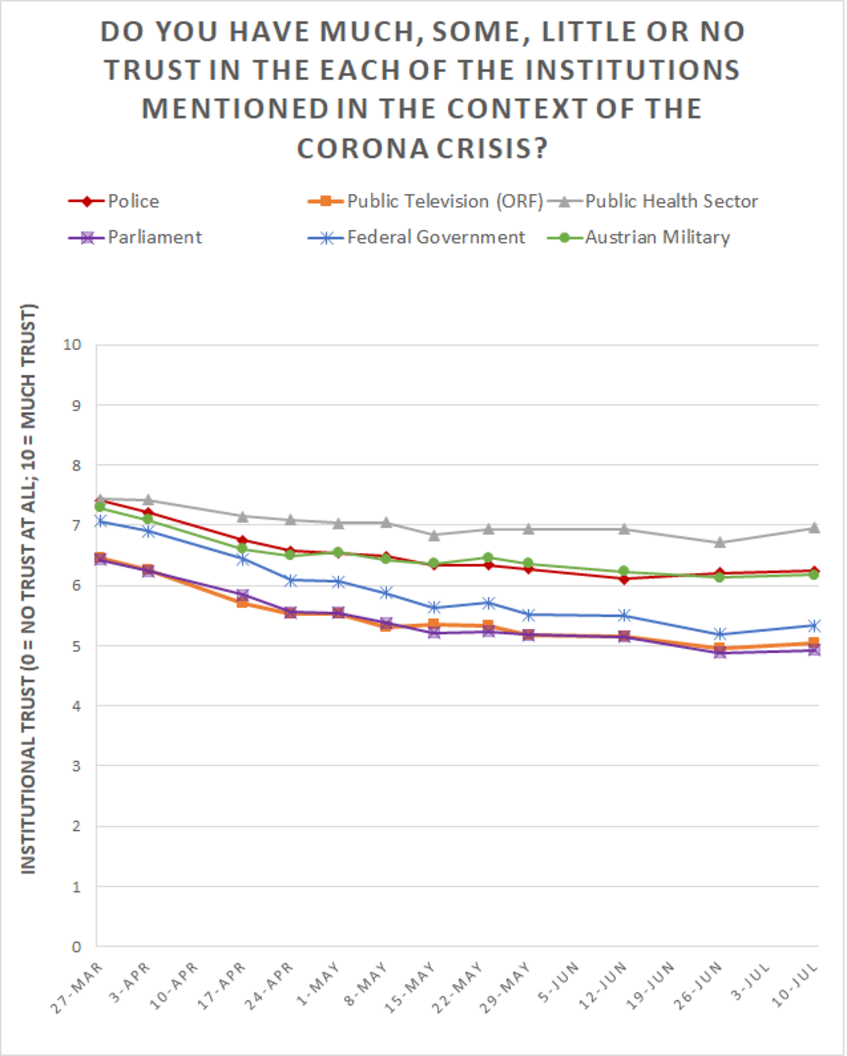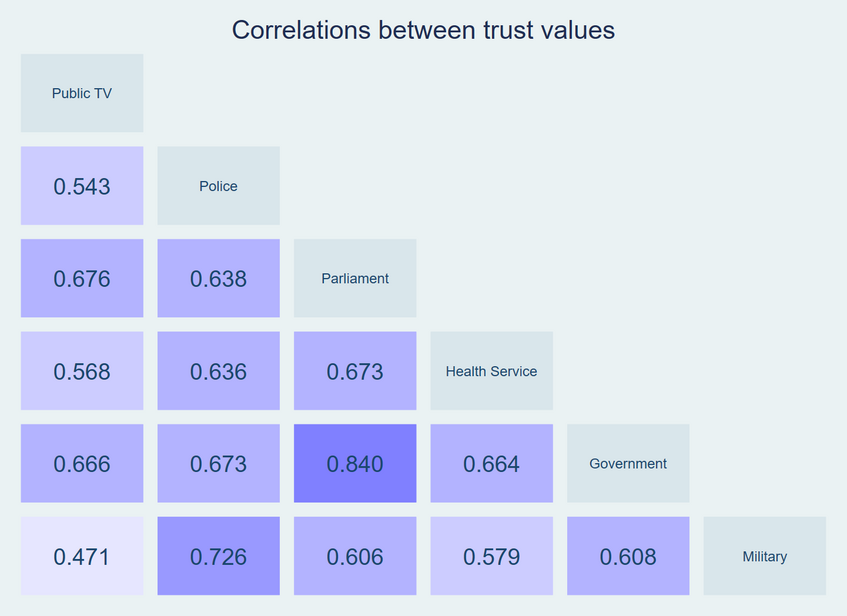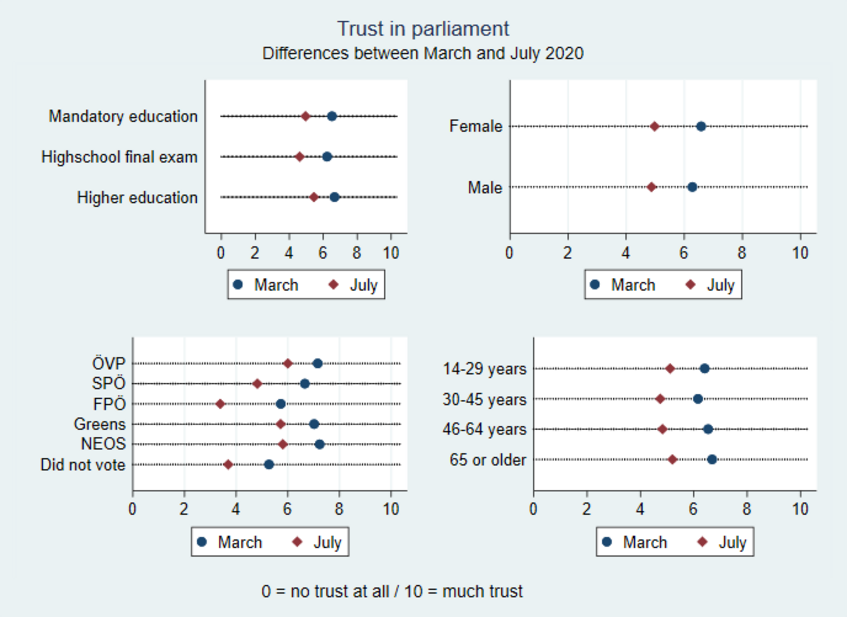29.07.2020
Who trusts the state? Institutional trust in times of Corona
- At the beginning of the Corona crisis, the Police, the Austrian Military, the Public Health System, the Public Television (ORF), the Parliament and the Federal Government enjoyed a very high level of trust among the population.
- Over time, however, there was a decline in trust; above all political institutions such as the Parliament or the Federal Government lost trust, as well as the ORF.
- The example of the Parliament shows that voters of SPÖ and FPÖ, non-voters and people with a lower level of education lost trust during the Corona crisis.
by Nikolaus Kowarz and Markus Pollak
Many countries have reacted to the corona pandemic with far-reaching measures to slow down the spread of the virus - including Austria. Decrees and emergency laws led to weeks of standstill in public life and had an unprecedented impact on the private lives of the population. A key role was played by state institutions that issued and executed such measures and also sanctioned non-compliance. According to David Easton, support for institutions (expressed by high levels of trust) is an important foundation of a political system. The political system is legitimized by a dynamic of input and output. Particularly in times of crisis, the "institutional trust", as it is called in political science, is essential for public policies, since interventions in people's personal lives can only be implemented if at least a basic trust in state actors exists. In an international comparison, it is remarkable that non-partisan executive bodies such as the Police or the Austrian Military enjoy a particularly high level of trust among the population in Austria. As analysed in the Austrian value study "Quo Vadis Austria" by a team of researchers led by Sylvia Kritzinger, a comparatively high level of general trust in institutions can be observed in Austria, which has even increased in recent years.
Trust in institutions during the Corona crisis
The corona crisis confronted the institutions with completely new challenges and tested the population's trust in state institutions. Within the framework of the Austrian Corona Panel Project, respondents were asked about their trust in relevant institutions. Figure 1 shows the average trust over time in the Police, the Public Television (ORF), the Public Health System, the Federal Government, Parliament and the Austrian Military, with the trust scale ranging from 0 ( = no trust at all) to 10 ( = much trust).
First of all, all institutions in Austria that were questioned enjoyed a very high level of trust during the first weeks of the crisis. The top performer was the Public Health System with a value of over 7.4 in the first days of the lockdown. The results become more diverse over time. While trust in the Public Health System, the Police and the the Austrian Military remains at a high level, there is a loss of trust in Parliament, the Federal Government and the ORF (see blog 32). The Parliament loses 1.5 and the ORF 1.4 trust points. In July, the Federal Government even recorded a 1.7 drop in trust compared to the beginning of the crisis. Despite these losses, however, the above-mentioned institutions are still enjoying quite good trust values after 15 weeks of crisis.
In fact, it seems that the development of trust in the different institutions is almost parallel. The correlation values visualised in Figure 2 confirm this, with two pairs standing out. On the one hand, there is a strong correlation between trust in Parliament and in the Federal Government; on the other hand, the correlation between the Police and the Austrian Military also shows a very high value. The higher the value, the greater the statistical correlation. This means that people who have a high level of trust in one of these institutions are also more likely to have a high level of trust in the other. Nevertheless, the positive significant correlation between all the institutions surveyed is an indication that there are certain groups of people who mistrust state institutions across the board and those who generally have a high level of trust in the state.
Who loses trust?
The trust in Parliament over time is intended to show by example, which population groups have lost trust in state institutions - in this case the Parliament - during the Corona crisis. A descriptive analysis allows the identification of certain patterns. Figure 3 shows the loss of trust in the Austrian Parliament between March and July 2020 according to the characteristics education, gender, voting behaviour and age. Not surprisingly, there is a loss of trust in all sub-groups without exception. Characteristics such as age and gender seem to have very little influence on whether a person loses more or less trust in Parliament during the Corona crisis. The situation is different with the educational background. Respondents with a lower level of education show on average a greater decline in trust in Parliament than respondents with a higher level of education. Voting behaviour also reveals differences. Especially non-voters as well as voters of FPÖ and SPÖ have clearly lost trust in Parliament during the last months. Voters of the two governing parties ÖVP and the Greens as well as voters of the NEOS showed very high trust in the Parliament at the beginning of the crisis and still show quite high levels of trust despite small decreases.
Conclusion
In summary, all the institutions surveyed enjoyed a very high level of trust among the Austrian population at the beginning of the corona crisis. Over time, however, there was a loss of trust, especially in political institutions such as the Parliament or the Federal Government, but also in the Public Television (ORF). Institutions that are responsible for public security and especially health - the Police, the Austrian Military and the Public Health System - and which enjoyed a high level of trust in Austria even before the corona crisis, have lost very little trust since March 2020. Overall, however, it can be observed that the "rally-around-the-flag" effect (see blog 45), which sets in during crises, has decreased significantly in Austria. The list of correlation values shows that there are coherent "pairs" of government institutions, each of which receives very similar trust from the population. Therefore, it makes sense to examine state institutions individually, as the various institutions are perceived differently. Finally, it is evident that, above all, party political preferences and the educational background of the respondents show correlations regarding the question of whether trust in Austria's state institutions was lost during the Corona crisis.
Nikolaus Kowarz works as student assistant at the Institute of Government at the University of Vienna and is studying Political Science for his Master's degree.
Markus Pollak works as student assistant at the Institute for Economic Sociology at the University of Vienna on the Austrian Corona Panel Project. He is studying political science for his Master's degree



